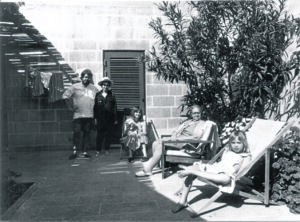In 1928, the government’s statistics office conducted a nationwide survey of 224,000 workers and their holiday habits. They found that just 85,000 could afford to take a holiday, and only a mere three to four days of paid leave were offered to those employed as ironworkers, the largest national industry at the time.
A decade of pressure from the country’s trade unions finally had an effect. In 1938, Parliament passed historic legislation: ‘the holiday law’, which gave every worker the right to two weeks’ holiday – with pay.
A previous law eight years earlier had allowed high-ranking public officials to enjoy a month-long holiday, but there had never been any legislation to protect lower-standing workers’ rights to a break.
No LOLs from LO
As a direct result of the legislation on paid holiday, the co-operative business ‘Danske Folkeferie’ (Danish people’s holidays) was born on 17 October 1938. The aim of the organisation was to offer a pleasant, safe environment in which workers could spend affordable holidays. The group built holiday colonies with grants from the Confederation of Trade Unions (LO), the Confederation of Danish Employers and the Ministry of Employment.
When Danske Folkeferie began leasing holiday homes in 1951, there were queues way down the street outside the company’s offices in Copenhagen. A total of 25,000 families applied for the chance to rent a cheap holiday home during the school vacation that year, and 2,000 of them were successful.
The co-operative, trade union-funded company created purpose-built holiday villages along the Danish coastline where families could relax in small chalets. The first such holiday village was built in Esbjerg in 1939, with more following in the 1940s and 50s.
Borrowing from Butlins?
The accommodation came in small wooden buildings with fold-out beds, bunk beds and kitchenettes, while the toilet facilities were found in a separate, shared building. It was all a little like the Butlins camps in Britain – but without the glamorous grannies and knobbly knee contests.
These ‘holiday villages’ still exist today – still run by Danske Folkeferie. These days, toilets and showers are provided in the houses (which continue to be wooden), while the villages have been renamed ‘holiday centres’.
In 1953, by which time the right to paid vacation had been law for 15 years, it was extended by the government to three weeks.
Most families, however, were still not able to afford a real holiday – in Denmark or abroad. Most stayed at home for the duration, while around a third went to stay with family or friends in another part of the country.
For many, their ‘kolonihave’ or allotment provided a weekend retreat from urban life, while others went camping with the well-worn family tent.
Chartering them away
The vacationing families did not have cars, often reaching their destinations by bike or public transport, usually with an enormous amount of luggage. It was long before the establishment of either motorways or the Great Belt Bridge between Jutland and Funen, so even trips over small distances must have seemed epic.
The following decades, of course, brought great changes. The 1960s, for example, saw the birth of the charter holiday industry and affordable package deals to foreign lands. Malta became a popular destination with Danes, and in 1979, Danske Folkeferie built its first foreign holiday centre on the island.

After almost 20 years unchanged, Parliament ruled in 1971 in favour of an extra week of paid leave. This figure was increased to five weeks in 1979, and this legislation remains the same today.














